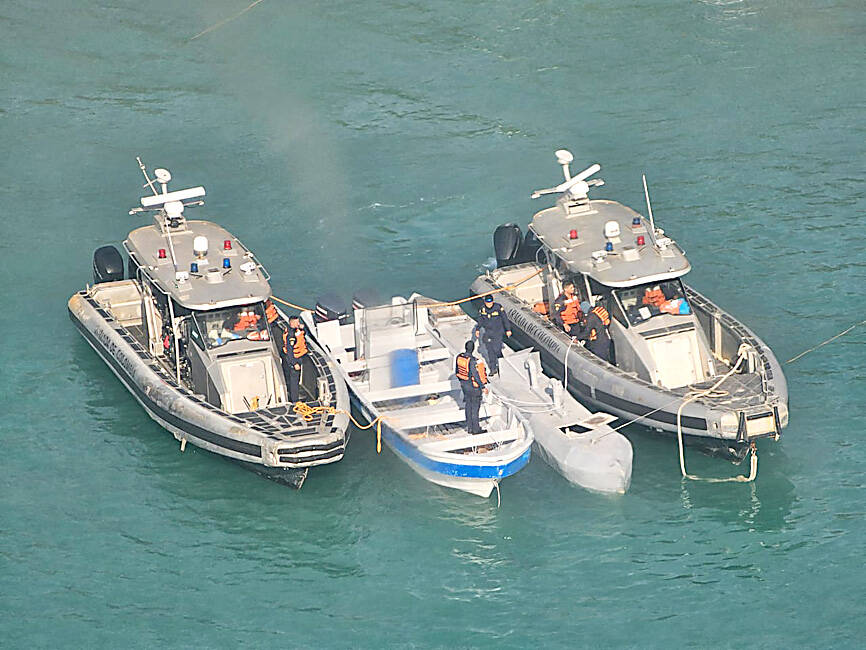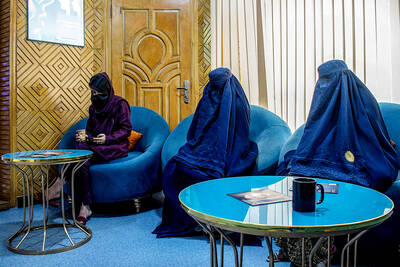The Colombian Navy on Wednesday announced its first seizure of an uncrewed narco-submarine equipped with a Starlink antenna off its Caribbean coast.
The vessel was not carrying drugs, but the navy and Western security sources based in the region said they believed it was a trial run by a cocaine trafficking cartel.
“It was being tested and was empty,” a naval spokeswoman confirmed.

Photo: Colombian Navy Press Office via AFP
Crewed semi-submersibles built in clandestine jungle shipyards have been used for decades to ferry cocaine north from Colombia, the world’s biggest cocaine producer, to Central America or Mexico.
However, in the past few years, they have been sailing much further afield, crossing the Atlantic and Pacific oceans.
The latest find, announced by Admiral Juan Ricardo Rozo at a news conference, is the first reported discovery in South American waters of a drone narco-submarine.
The Colombia Navy said it was owned by the Gulf Clan, the country’s largest drug trafficking group and had the capacity to transport 1.5 tonnes of cocaine.
A video released by the navy showed a small gray vessel with a satellite antenna on the bow.
It is not the first time a Starlink antenna has been used at sea by suspected drug traffickers.
In November last year, Indian police seized a giant consignment of meth worth US$4.25 billion in a vessel steered remotely by Starlink near the remote Andaman and Nicobar Islands.
Cocaine production, seizures and use all hit record highs in 2023, the UN Office on Drugs and Crime said last month.
In Colombia, production has reached record levels, fueled by surging global demand.
Rozo said the use of autonomous subs reflected the traffickers “migration toward more sophisticated unmanned systems,” which are hard to detect at sea, “difficult to track by radar and even allow criminal networks to operate with partial autonomy.”
Juana Cabezas, a researcher at Colombia’s Institute for Development and Peace Studies, said that powerful Mexican drug cartels, who operate in Colombia, “hired technology experts and engineers to develop an unmanned submarine” as far back as 2017.
Drone vessels make it harder for the authorities to pinpoint the drug lords behind the shipments, she said.
“Removing the crew eliminates the risk of captured operators cooperating with authorities,” said Henry Shuldiner, an investigator for the US-based InSight Crime think tank, who coauthored a report on the rise of narco-subs.
Shuldiner also highlighted the challenge of assembling crews to sail makeshift subs described as floating “coffins.”

BEIJING FORUM: ‘So-called freedom of navigation advocated by certain countries outside the region challenges the norms of international relations,’ the minister said Chinese Minister of National Defense Dong Jun (董軍) yesterday denounced “hegemonic logic and acts of bullying” during remarks at a Beijing forum that were full of thinly veiled references to the US. Organizers said that about 1,800 representatives from 100 countries, including political, military and academic leaders, were in Beijing for the Xiangshan Forum. The three-day event comes as China presents itself as a mediator of fraught global issues including the wars in Ukraine and Gaza. Addressing attendees at the opening ceremony, Dong warned of “new threats and challenges” now facing world peace. “While the themes of the times — peace and development —

Decked out with fake crystal chandeliers and velvet sofas, cosmetic surgery clinics in Afghanistan’s capital are a world away from the austerity of Taliban rule, where Botox, lip filler and hair transplants reign. Despite the Taliban authorities’ strict theocratic rule, and prevailing conservatism and poverty in Afghanistan, the 20 or so clinics in Kabul have flourished since the end of decades of war in the country. Foreign doctors, especially from Turkey, travel to Kabul to train Afghans, who equally undertake internships in Istanbul, while equipment is imported from Asia or Europe. In the waiting rooms, the clientele is often well-off and includes men

BRIBERY ALLEGATIONS: A prosecutor said they considered the risk of Hak-ja Han tampering with evidence to be very high, which led them to seek the warrant South Korean prosecutors yesterday requested an arrest warrant for the leader of the Unification Church, Hak-ja Han, on allegations of bribery linked to the country’s former first lady and incitement to destroy evidence. The move came a day after the 82-year-old was questioned over her alleged role in bribing former first lady Kim Keon-hee and a lawmaker. Founded in 1954 by her late husband, Sun Myung Moon, the Unification Church has long been the subject of controversy and criticism, with its teachings centered on Moon’s role as the “second coming” and its mass weddings. Followers are derisively referred to as “Moonies.” However, the church’s

Venezuela on Saturday organized a day of military training for civilians in response to the US deployment in the Caribbean, and amid new threats from US President Donald Trump. About a month ago, Washington deployed warships to international waters off Venezuela’s coast, backed by F-35 jets sent to Puerto Rico in what it calls an anti-drug and anti-terrorism operation. Venezuelan Minister of Defense Vladimir Padrino Lopez has accused Washington of waging “undeclared war” in the Caribbean, after US strikes killed over a dozen alleged drug traffickers off his country’s coast. Caracas also accused the US of seeking regime change, and